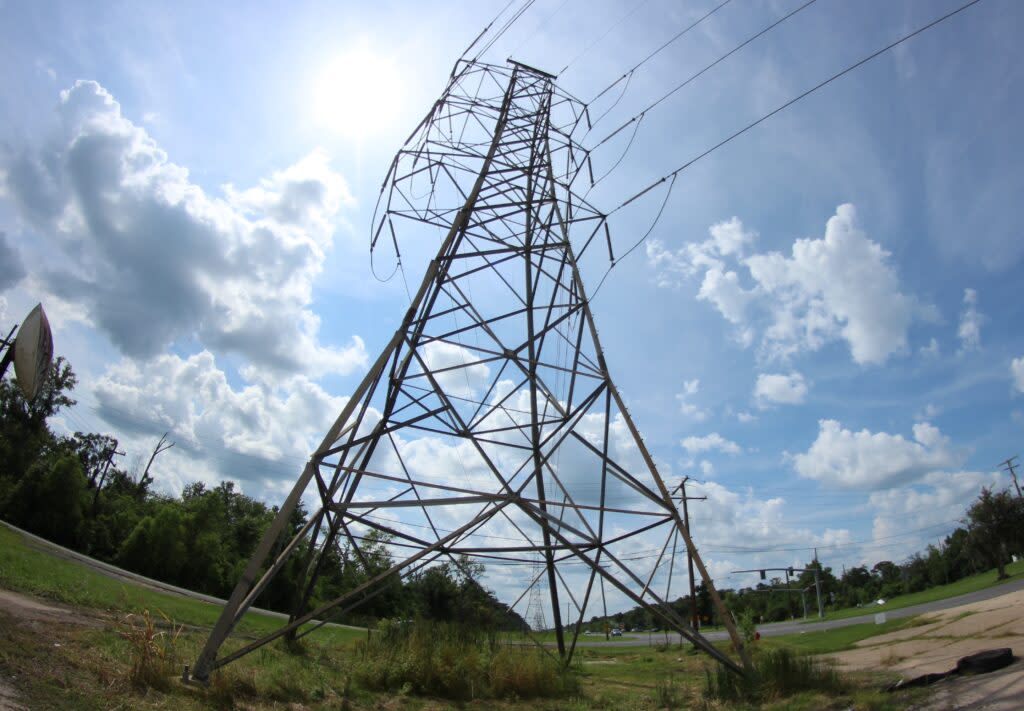Customers who save on electric bills could be forced to pay utility company for lost profits

An energy transmission tower carries electricity outside of LaPlace, La., on July 1, 2024. (Photo credit: Wes Muller/Louisiana Illuminator)
Louisiana’s major electric utilities are still pushing state regulators to allow them to charge customers for the costs of a new statewide energy efficiency program and for the electricity customers will no longer need because of that program.
A large group that included Louisiana Public Service Commission staff, utility company executives, consumer advocates and other energy experts met Wednesday to evaluate bids from companies that want to oversee Louisiana’s new energy efficiency program.
The LPSC’s new energy efficiency program will require certain statewide energy savings targets. Hitting those targets could require the administrator to implement things like appliance upgrades for large commercial buildings or smaller efforts like helping low-income customers insulate their homes.
While the idea might seem like a straightforward solution to cut back on waste, utility company executives aren’t very happy with it. In general, utility companies earn more profit when homes and businesses waste electricity. Less waste leads to lower electric bills, which could mean lower profits for the utilities.
Entergy Louisiana and Cleco vehemently opposed the idea and successfully delayed its adoption for years. A consultant the commission hired to write the basic guidelines for the program spent 13 years and over a half-million dollars trying to appease utility companies with agreeable rules.
Fed up with the delays, Commissioner Craig Greene, R-Baton Rouge, ended the stalemate in January and joined with the two Democrats on the commission in adopting what they say is a more consumer-friendly program than the one the utilities wanted.
Nevertheless, customers will still foot the bill for the program and have been doing so for years. Entergy Louisiana customers can find those fees on their monthly statements billed as “Rider EECR-QS” and “Rider EECR-PE.”
Even though customers are covering all the costs of the program, the utility companies could end up squeezing them for lost profits with so-called “under-earning” fees. The utility companies lobbied the LPSC to keep a provision that allows them to tack on additional charges to make up for profits they miss out on when their customers no longer waste electricity. In other words, the utilities want their customers to pay fees for both the energy efficiency program and for the electricity they will no longer use because of the program.
The commissioners denied the utilities version of that policy, and while the matter is settled for the time being, the utility executives have signaled that they don’t intend to ease up on the pressure.
Although the current members of the commission would be less likely to change the policy to accommodate the wishes of the utility companies, the panel is expected to look very different after this fall’s election. Commissioner Greene, a moderate Republican who has tempered partisanship on the commission as the lone swing vote between two Democrats and two other Republicans, is not seeking reelection. His solidly-conservative district could elect someone who shifts the LPSC farther right in support of policies that benefit the utility companies.
The lost profit recovery issue was a major sticking point for utility executives during prior debates and briefly resurfaced at Wednesday’s meeting before Commissioner Davante Lewis shut it down, saying the purpose of the meeting was not to debate an already settled issue.
Lewis told the executives the commission invited them to participate in Wednesday’s work session simply to evaluate the bids and expected them to contribute with constructive comments. He said he would gladly exclude them from future work sessions if they tried to derail the purpose of the meeting.
“I wanted to remind them that the fight was over, and that they asked to participate in helping hire an administrator,” Lewis said later in an interview.
In May, the LPSC issued a request for proposals seeking a third-party administrator to build and oversee the new energy efficiency program.
The commission received initial responses from nine companies, and three ended up submitting formal proposals. They are Frontier Energy, TRC and APTIM. Although all three companies have offices in the state, only APTIM is headquartered in Louisiana.
The commission revealed APTIM was the lowest bidder, TRC as the middle bidder and Frontier Energy was the highest. The commission staff said they will disclose the specific dollar amounts of each bid at a later date.
APTIM was also the only bidder to express any interest in taking on the full day-to-day implementation of the program. The LPSC will allow the administrator they hire to directly handle the implementation or hire a subcontractor to do the work.
The commission plans to interview the bidders in August and hold a selection vote in September. Formal contracts will then be signed and finalized over the subsequent months. Next year will serve as a transition period from the voluntary program before the mandatory program officially starts on Jan. 1, 2026.
Correction: A previous version of this article incorrectly described the final version of the LPSC’s energy efficiency rules as containing a Lost Contribution to Fixed Costs policy that would allow utilities, with commission approval, to charge their customers to recover profits lost as a result of the energy efficiency program. That policy was actually removed from the final version, though nothing precludes the LPSC from adopting it in the future.

